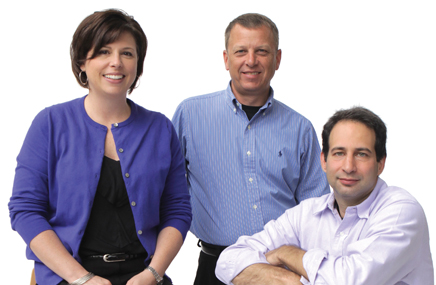MicroMass’s revenues were flat last year. Former president Jay Bigelow and the Cary, NC-headquartered agency parted ways amicably, and a new partnership model was instated, with COO Jeff Burkel, EVP Alyson Connor and CFO Phil Stein all becoming partners.
“We felt we could run the business more effectively as a partnership,” Burkel says. “We rededicated the whole organization to a singular focus on being true to our behavioral science foundation.”
A behavioral consulting business unit was formalized last year.
“We do our own research into everything from best practices to uncovering secrets of human health behavior,” Burkel says. “We invest in that to create our own intellectual property to help clients. That was part of the rationale for forming the behavior sciences consulting unit. We can sell our expertise in that arena alone. We don’t have to build a soup-to-nuts campaign to be successful.”

Headcount remained flat at about 60 with some natural attrition. New senior hires included VP creative director Don Martiny; director of mobile marketing services Rudy Nash; group account supervisor Molly Stallings; and senior behaviorist Diane Freeman.
An office of three full-time employees was opened in Chicago to help service anchor client Takeda, with plans to pursue additional client opportunities in the area and increase staff against business as needed.
About 80% of business is digital, and Connor notes there is rarely a piece of business that doesn’t have a digital component.
Last year’s highlights included embarking on a new relationship with GlaxoSmithKline on an enterprise-wide initiative and expanding work with Takeda to include consumer and digital AOR status to launch hypertension treatment Edarbyclor.
“We did some exciting research and evaluation of the existing patient support programs in the market,” Connor says. “Everyone says they’re doing patient support programs, but no one had ever looked at best practices and what exactly is going on in the industry. We got unbelievable response. We conducted a marketing initiative around it, including a white paper, e-mail campaign, microsite, advertising. It was a rigorous campaign and we got great leads. The GSK win came as a result.”
Additional wins from existing clients included consumer and digital AOR work on United Therapeutics’ PHA medications Tyvaso and Remodulin, and expanded work on Grifols’s immunoglobulin therapy Gamunex, plus work on another prelaunch product from Grifols. The agency began a new relationship with nutrigenomics and lifestyle medicine company Metagenics with a digital AOR award.
The agency completed projects it had been involved in for B. Braun, Physicians Pharmacy Alliance, and Bayer’s Mirena (IUD). Work ended with Fosrenol because Shire stopped marketing the drug.
“The world is moving to a patient-centric approach,” according to Connor. “Whether it’s direct to patient through the HCP or through the sales force, it begins with the patient. Changing the mindset of clients from the product-centric traditional marketing approach [is an ongoing challenge]. Some clients we have to prod and push along. Others are already there.”
Revenue is expected to trend upward for this year. Burkel says the agency is aiming to achieve 20% growth.
“We’re looking to greatly expand work in the behavior consulting arena,” he says. “We used to be fairly insular in keeping that intelligence to ourselves.
“We’re reaching out to a host of partners that have a value for that insight—a couple of a major holding companies that don’t have it and some CROs.”
From the July 01, 2012 Issue of MM+M - Medical Marketing and Media








